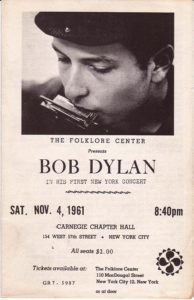
By now you’ve probably heard that Bob Dylan has been awarded the 2016 Nobel Prize for Literature, and you probably won’t be able to turn on a radio or a TV today without hearing a Bob Dylan song. Sara Danius, the permanent secretary of the Swedish Academy, “advised those unfamiliar with the work of Dylan” — who’s that? — “to start with the 1966 album Blonde on Blonde.”
Not a bad suggestion, but Dylan’s “Song for Woody,” which he set to the tune of “1913 Massacre,” is really the better place to start tracing Dylan’s journey and to appreciate the act of self-creation that turned Robert Allen Zimmerman into Bob Dylan.
Dylan still performs the song — or, more accurately, he started performing it again around 1999 and 2000. The original recording appeared in 1962.
http://dai.ly/x155k7u
In his formative years, Dylan emulated Woody; he even dressed like Woody and combed his hair like him. In 1961, he made a pilgrimage to Woody’s house and visited him in the hospital. Later that year, when performing “1913 Massacre” at Carnegie Hall, Dylan would remember learning the song along with “Ludlow Massacre” from Woody as a “group of two.”
Here’s how Arlo Guthrie remembered Dylan’s visit in an interview we did for the film:
Well I remember the day in 1961 when Bob Dylan came to our house. I was 13 years old. He must have been 20. And ah, he wanted to know where my dad was. And I told him he was down the road, you know he was in the hospital at the time. And the next, within the next few years, there was this massive human undertaking around the world, this great drama of events being played out. And the sound track was Bob Dylan songs. It was an incredible. I mean not just Bob Dylan songs, but they were a major part of the sound track of the times that were going on.
And I think one of the reasons that that probably happened was because he had taken this technique of talking about serious issues, reading the papers, going to places where people were struggling. Writing their stories from their point of view, and doing it with such poetry and such power. Such simple music. Nothing complicated in these Bob Dylan music songs. But poetically, verbally, text-wise, mighty powerful imagery, that goes beyond the average ability of a mind to foresee what’s coming next. It was always surprising. And not only that, half the time it was angry and pissed off and wonderfully so, because he was angry about the same things that everybody else was angry about so when we heard a Bob Dylan song he was speaking for us. In the same way that I think my dad had spoke for a lot people a generation before.
